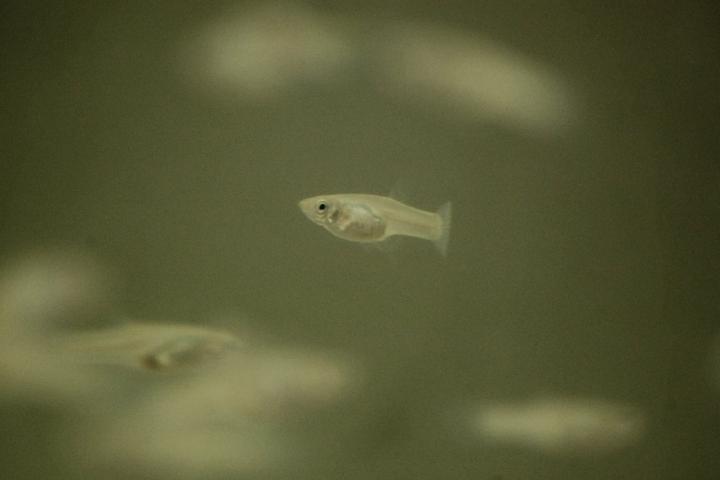
Credit: Lysanne Snijders
For male Trinidad Guppies applies: if you are hungry, seek female company. A recent study led by scientists of the the Leibniz-Institute of Freshwater Ecology and Inland Fisheries (IGB) and the Leibniz Institute for Zoo and Wildlife Research (IZW) together with other research institutions provides evidence that male guppy fish in the presence of females more often ended up at novel food patches. In contrast, female food discovery was independent of male presence.
Trinidad guppies (Poecilia reticulata) live in small watercourses in the rainforests of Trinidad. They have a preference for sporadic high-quality food resources, like fruits and insects, falling into the water- so it is usually uncertain when and where they encounter food. In this study, behavioural ecologist Lysanne Snijders and her team set up a field experiment and manipulated guppy sex compositions (all male, all female or mixed) in the wild using individually colour-marked guppies. They conducted social observations, followed by foraging trials.
Males reached more food patches when there were females around. Yet, females reached a similar number of patches either with or without males present. Males also spent less time social in absence of females, but the absence of males had no effects for females. The researchers analysed if this time spent socially was linked to patch discovery success. Indeed, in agreement with a previous study, more social guppies ended up at more food patches.
“Life in the group can be advantageous. You have to share the food with your peers, but it is also easier to find it if you use the information of others,” explains Lysanne Snjiders. Guppies, for example, react to the typical behaviour of successful food finders, which is: swim faster, grab food, stay there and eat.
The researchers can only guess why males behave differently in the absence of females than in sexually mixed groups. “In this case, males among themselves are more likely to be in a state of competition than cooperation and therefore spend less time together and miss out on important information,” says Lysanne Snijders.
The head of the study, IGB-researcher Prof. Jens Krause, is investigating the dynamics of swarm behaviour and collective intelligence in animals. He explains the importance of this field of research: „If we are able to understand the interactions of animals within a group, we can derive from this knowledge information about the spread of diseases, reproduction and predator-prey relationships. The structure of social networks may also be a decisive factor concerning the stability of a population. Such knowledge may help wildlife managers and conservationists, for example, to optimise disease management, breeding programmes or reintroduction activities.”
###
Media Contact
Lysanne Snijders
[email protected]
Original Source
https:/
Related Journal Article
http://dx.




